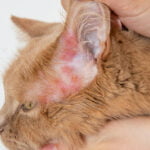Table of Contents
Pet allergies can be distressing for both pets and their owners. Identifying and treating these allergies naturally can significantly improve your pet’s quality of life. This guide explores how to treat pet allergies naturally using various natural remedies and lifestyle adjustments.

Understanding Pet Allergies
Pet allergies occur when the immune system overreacts to a normally harmless substance, known as an allergen. Common allergens include pollen, dust mites, mold spores, certain foods, and flea saliva. Symptoms of pet allergies can include itching, redness, swelling, sneezing, and gastrointestinal issues. Understanding the cause is the first step in learning how to treat pet allergies naturally.
1. Dietary Adjustments
Food allergies are common in pets and can often be managed through dietary changes. Here are some tips:
- Elimination Diet: Identify and eliminate potential allergens from your pet’s diet. Gradually reintroduce foods to pinpoint the allergen.
- Hypoallergenic Diet: Feed your pet a diet made from hypoallergenic ingredients that are less likely to trigger allergies. Consider options like novel protein diets (e.g., duck or venison).
- Natural Supplements: Add omega-3 fatty acids, such as fish oil, to reduce inflammation and support skin health.
2. Regular Bathing
Regular bathing can help remove allergens from your pet’s skin and coat, providing relief from itching and irritation. Here’s how to do it effectively:
- Gentle Shampoo: Use a gentle, hypoallergenic shampoo specifically designed for pets. Avoid harsh chemicals that can irritate the skin.
- Oatmeal Baths: Oatmeal baths can soothe irritated skin and reduce itching. Look for shampoos containing colloidal oatmeal.
- Frequency: Bathe your pet as often as needed, typically once a week, to keep allergens at bay.
3. Air Purification
Improving indoor air quality can significantly reduce airborne allergens. Consider these strategies:
- Air Purifiers: Invest in a high-quality air purifier with a HEPA filter to remove allergens from the air.
- Regular Cleaning: Dust and vacuum your home frequently to reduce dust mites and other allergens. Use a vacuum with a HEPA filter for best results.
- Humidity Control: Keep indoor humidity levels low to prevent the growth of mold and mildew, which can trigger allergies.
4. Natural Topical Remedies
Natural topical treatments can soothe your pet’s skin and provide relief from itching. Try these remedies:
- Coconut Oil: Apply coconut oil to your pet’s skin to moisturize and reduce inflammation. It also has antimicrobial properties.
- Aloe Vera: Use pure aloe vera gel to soothe irritated skin. Ensure it’s free from additives that could be harmful to pets.
- Apple Cider Vinegar: Dilute apple cider vinegar with water (1:1 ratio) and spray it on your pet’s coat to relieve itching. Avoid open sores or raw skin.
5. Herbal Supplements
Herbal supplements can support your pet’s immune system and reduce allergy symptoms. Some effective options include:
- Quercetin: Known as nature’s antihistamine, quercetin can help reduce allergic reactions.
- Bromelain: Often used in conjunction with quercetin, bromelain can enhance its anti-inflammatory effects.
- Licorice Root: This herb has anti-inflammatory properties and can soothe irritated skin.
6. Flea Control
Flea allergies are common in pets and can cause severe itching and discomfort. Natural flea control methods include:
- Flea-Repellent Plants: Use plants like lavender, rosemary, and marigold in your garden to repel fleas naturally.
- Diatomaceous Earth: Sprinkle food-grade diatomaceous earth on your pet’s bedding and around your home to kill fleas naturally.
- Essential Oils: Use essential oils like eucalyptus, tea tree, and citronella (diluted properly) to repel fleas. Always consult a vet before use.
7. Stress Management
Stress can exacerbate allergy symptoms in pets. Managing stress through natural methods can improve their overall health:
- Regular Exercise: Ensure your pet gets regular exercise to reduce stress and improve their immune system.
- Calming Aids: Use natural calming aids like chamomile, valerian root, or CBD oil to help reduce anxiety.
- Comfortable Environment: Provide a safe and comfortable environment for your pet, including a quiet space to retreat when stressed.
Conclusion on How to Treat Pet Allergies Naturally
Understanding how to treat pet allergies naturally can significantly improve your pet’s quality of life. By making dietary adjustments, using natural topical remedies, improving air quality, and managing stress, you can help alleviate your pet’s allergy symptoms. Always consult your veterinarian before starting any new treatment to ensure it’s safe and appropriate for your pet. For more tips and advice on pet care, visit the ASPCA and AKC.
FAQs on How to Treat Pet Allergies Naturally
What are the most common allergens for pets?
Common allergens for pets include pollen, dust mites, mold spores, certain foods, and flea saliva.
Can diet help with pet allergies?
Yes, dietary adjustments can help manage food allergies and improve your pet’s overall health. An elimination diet or hypoallergenic diet can be effective.
How often should I bathe my pet to reduce allergies?
Bathing your pet once a week with a gentle, hypoallergenic shampoo can help remove allergens and soothe their skin.
What natural remedies can I use for my pet’s itchy skin?
Natural remedies like coconut oil, aloe vera, and diluted apple cider vinegar can help soothe your pet’s itchy skin.
Are there any herbal supplements that can help with pet allergies?
Yes, herbal supplements like quercetin, bromelain, and licorice root can support your pet’s immune system and reduce allergy symptoms.
How can I improve my home’s air quality to help my allergic pet?
Using air purifiers, regular cleaning, and controlling indoor humidity can significantly reduce airborne allergens and improve air quality.











